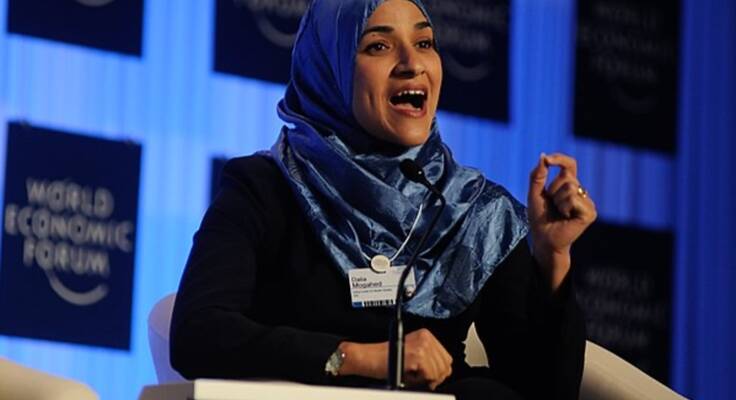Boston University fellow Dalia Mogahed will ‘help bring our community together,’ MIT says.
Alec Schemmel, Washington Free Beacon
In an attempt to ease campus “tension” following Hamas’s Oct. 7 attack on Israel, the Massachusetts Institute of Technology is slated to bring a series of guest speakers to campus—including one who endorsed Hamas terrorism as an act of lawful “resistance.”
As part of its “Standing Together Against Hate” initiative, MIT is slated to hold a March 18 talk on Islamophobia featuring Boston University antibigotry fellow Dalia Mogahed. While MIT says the talk will help “bring our community together” by addressing “real tension between some groups and individuals,” Mogahed’s hostile rhetoric toward the Jewish state suggests her speech will have the opposite effect.
On Jan. 19, for example, Mogahed argued that Hamas is allowed to terrorize Israel under international law because Palestinians are “living under occupation.”
“It has been firmly established that resistance, including struggle against a colonial occupation force, is not only acknowledged under international law but explicitly endorsed,” she said in a social media post.
“International humanitarian law further solidifies this principle by expressly embracing acts of resistance for national liberation. … As an occupied population, Palestinians inherently possess the right to resist.”
Mogahed deleted the post after the Washington Free Beacon contacted her for comment.
MIT’s decision to host Mogahed comes as the school faces criticism over its response to campus anti-Semitism.
MIT president Sally Kornbluth faced calls to resign in December after she participated in a disastrous congressional hearing, which saw her and other university leaders argue that calling for the genocide of Jews may not violate their school’s code of conduct.
House Republicans launched an investigation into MIT and other elite schools in the wake of the hearing.
Kornbluth has since vowed to reassess MIT’s policies on “harassment, bullying, intimidation, and discrimination.”
Mogahed’s inclusion in the school’s “Standing Together Against Hate” initiative, however, calls into question MIT’s pledge to combat anti-Semitism.
Kornbluth herself launched the initiative in November, citing it during her congressional testimony one month later as proof that MIT has “been crystal clear about the dangers of anti-Semitism and about the atrocity of the Hamas terror attack.”
On Dec. 19, meanwhile, MIT chancellor Melissa Nobles said the initiative would “confront the corrosive power of hate” and bring together “Jews, Israelis, Palestinians, Arabs, and Muslims.”
But Mogahed has routinely disparaged Israelis and the Jewish state.
Her Jan. 19 post endorsing Palestinian “acts of resistance” came in response to a video from self-described “anti-Zionist” activist Miko Peled.
Peled during the video called all Zionists racist and argued that “resistance to occupation, to settler-colonialism, to oppression, is sanctified by international law—even with the use of arms.”
“When the people of Gaza march … they’re not marching into an international border, which [Israel] would have you believe, they’re marching against a prison wall, a prison fence,” Peled added.
Mogahed has also suggested Israelis are “savages” who “kill babies” and “bomb hospitals.” During an October speech, she argued that pro-Israeli rhetoric is inherently “steeped in Islamophobia.”
And on Oct. 13, Mogahed launched a fundraising campaign for Baitulmaal, a Texas-based nonprofit that works closely with Hamas terrorists in the Gaza Strip.
An MIT spokeswoman nonetheless defended Mogahed’s upcoming lecture, saying the speaker is aligned with the “Standing Together Against Hate” initiative’s inclusive “spirit.”
“The organizers of Dialogues Across Difference confirm that all invited presenters embrace that the spirit of the series is about overcoming divides, not stoking them,” the spokeswoman told the Free Beacon. “The series is just one of the myriad efforts underway on campus.”
Mogahed is a scholar at the Institute for Social Policy and Understanding, a left-wing nonprofit that provides Muslim Americans with “well-informed dialogue and decision-making.”
Included among the group’s resources is a section defending the anti-Israel Boycott, Divestment, and Sanctions movement.
Mogahed also serves as an “antibigotry convening fellow” at Ibram X. Kendi’s Boston University Center for Antiracist Research.
Convening fellows at the center are expected to consider “fifteen categories of bigotry: ableism, ageism, anti-Asian/Asian American racism, anti-Black racism and colorism, anti-fat bigotry, anti-Indigenous bigotry, anti-Latinx racism, anti-Pacific Islander bigotry, antisemitism, classism, heterosexism and transphobia, Islamophobia, linguicism, religious intolerance, and sexism.”
